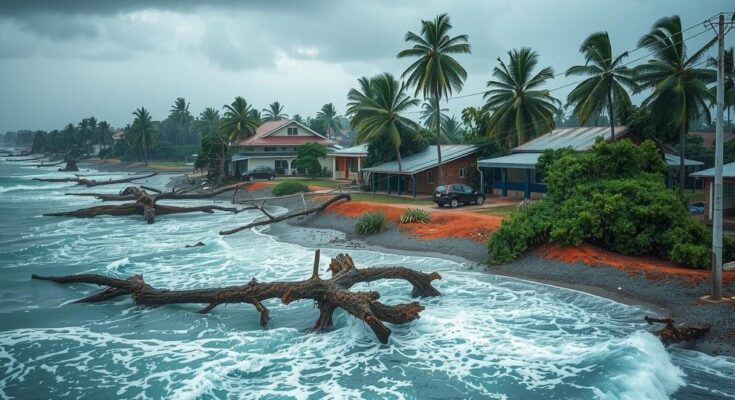Mozambique is currently facing Cyclone Dikeledi, which has intensified and is moving across Nampula province. With heavy rainfall and strong winds expected, about 255,310 individuals are projected to be affected. The Government’s emergency protocols have been activated, but humanitarian resources are stretched due to recent cyclone impacts.
As of January 13, 2025, Mozambique is contending with the re-emergence of Tropical Storm Dikeledi, which has intensified into a tropical cyclone and is progressing across Nampula province. The storm is anticipated to weaken as it traverses land but is expected to re-enter the Mozambique Channel near Angoche around January 14, where it may regain strength. Heavy rainfall exceeding 200 mm within a 24-hour period and damaging winds reaching up to 120 km/h are forecasted, particularly affecting coastal districts such as Mossuril, Angoche, Mogincual, and parts of Zambezia province. The National Institute for Disaster Management (INGD) estimates approximately 255,310 individuals could be impacted, with 98,000 identified as being in high-risk areas. Anticipatory action protocols have been activated, facilitating the deployment of support staff and the dissemination of critical advisories to vulnerable communities. However, humanitarian resources are constrained due to the ongoing risks, as Dikeledi marks the second cyclone to impact Mozambique within a month.
The current situation of Tropical Cyclone Dikeledi is particularly concerning as Mozambique has recently undergone a series of severe weather events, including Cyclone Chido. Given the country’s vulnerable geographical location, such weather patterns can lead to catastrophic outcomes like flooding and infrastructural damage. The INAM has been monitoring the cyclone’s development closely, issuing warnings that highlight the imminent dangers posed by Dikeledi in terms of wind speed and rainfall accumulation, which could exacerbate existing conditions in already affected areas.
In summary, Cyclone Dikeledi poses a severe threat to Mozambique’s Nampula, Cabo Delgado, and Zambezia provinces. With projections indicating that over 255,000 individuals could be impacted and significant rainfall expected, the situation remains critical. The INGD’s proactive measures aim to prepare for the imminent impact, though humanitarian response capacities are being tested due to the frequency of cyclones within the region. Comprehensive preparedness and community awareness will be essential in mitigating the potential fallout from this imminent weather event.
Original Source: reliefweb.int




